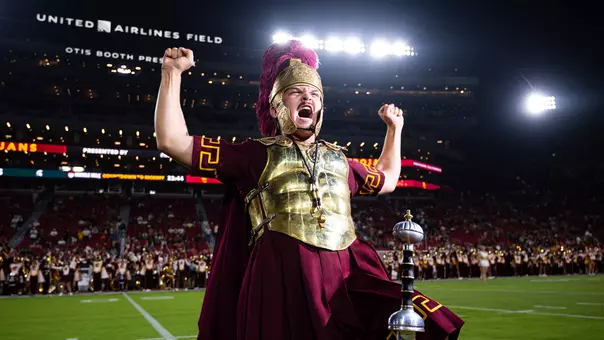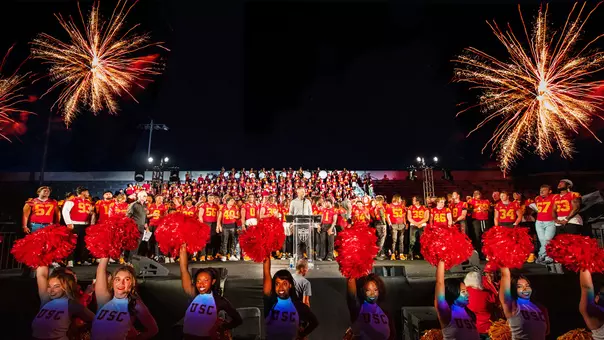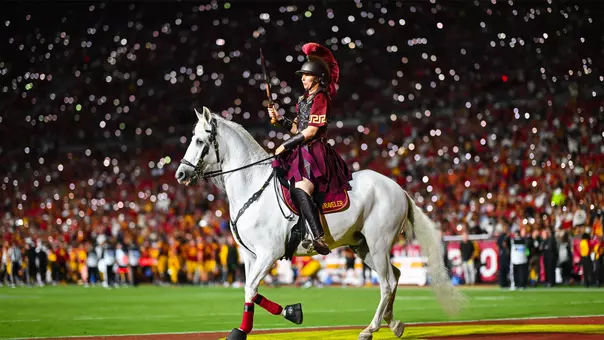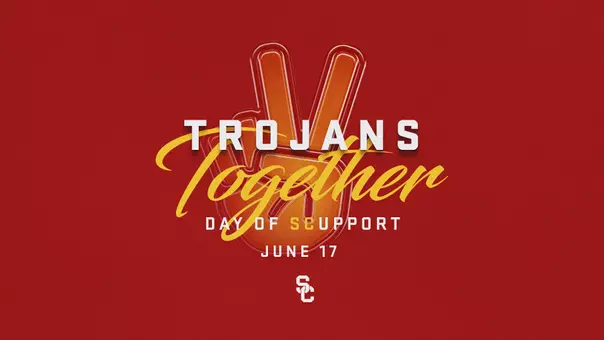University Southern California Trojans
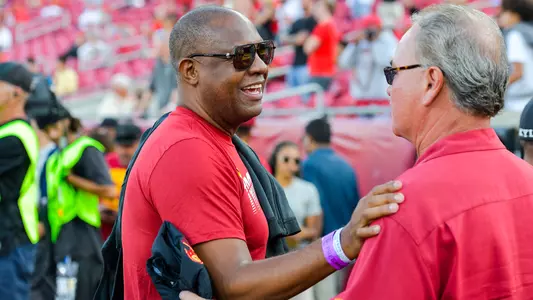
Interview With USC Football Great Rodney Peete
December 16, 2021 | Trojan Athletic Fund
Rodney Peete was the most elusive quarterback in USC annals, able to hurt opponents with his arm and legs. As a senior team captain in 1988, he was runner-up for the Heisman Trophy. In addition, he won both the Johnny Unitas Golden Arm Award (as the nation's top senior quarterback) and the Pop Warner Award (as the most valuable senior on the West Coast) while earning All-American first-team honors. Peete also was the 1988 Pac-10 Offensive Player of the Year while completing 62.1% of his passes for 2,812 yards and 18 TDs. The 4-year (1985-88) letterman and 2-time (1987-88) team MVP–a starter since late in his redshirt freshman campaign–set 17 USC career, season, and game records in passing and total offense. He ended his career third on the Pac-10 career passing (8,225) and total offense (8,640) yardage charts and currently ranks sixth on USC's all-time passing chart (and fifth in total offense). He threw 54 touchdowns in his career and rushed for 415 yards and 12 scores. He also started in the infield on the USC baseball team for three years (1985, 1987-88), posting a .297 career batting average with 18 home runs and 84 RBI. He made the All-Pac-10 first team in 1988 as a third baseman. After USC, he played 16 years in the NFL with the Lions, Cowboys, Eagles, Redskins, Raiders, and Panthers. He then became a TV and radio sports talk show host. He was inducted into the USC Athletics Hall of Fame in 2009 and received the NCAA Silver Anniversary Award in 2014.
What life lessons did you take away from your time at USC?
The number one thing: relationships. When I think of USC and specifically my time there, more than anything, it was about relationships, most of which I still have today, whether it be business or friendship. I grew up in Arizona, and my Dad was a football coach at the University of Arizona, so we knew about USC as my Dad would come to LA to recruit for U of A. When I got recruited, my Dad was one of the biggest supporters of my coming to USC because he said 'the relationships that you will get a build there will last you a lifetime.' He was right!
I'm rarely engaged in something where there is no connection to USC, whether it's been legal counsel, financial advice, deals I've done, real estate, you name it, it's always somehow trickled back to a relationship I developed at USC.
How did playing football at USC prepare you for your professional career?
It really helped me. One of the things about going to USC was that physically it helped you get ready because you were with top talent from across the country just on your team. Then, competing and playing against other schools with the best athletic talent challenged you. The moment you stepped on campus, fighting for playing time, being on the field, it helped you maintain your competitiveness and that you had to prove it to play. I was able to nurture that and take that to the NFL.
In addition, learning how to deal off the field once you get into the league, there's a lot of demands on your time, in terms of PR and media and dealing with public speaking, and USC really helped me prepare for that. I give a lot of credit to my good friend, Tim Tessalone, and Nick Salata, and the USC Sports Information department, who helped guide me and get me ready for the media barrage that awaited me once I got into the NFL. Understanding and handling the media and not looking at the media as an enemy but more as an ally and understanding everyone's role – I learned that from USC. Although I retired in 2005, I am still able to work in media and entertainment. I attribute that to having a good foundation in college and the advice and guidance I received.
What encouraged you to give back in the form of a scholarship?
When I got into a position to do that, I have very fond memories of what my USC scholarship did to provide a foundation for me, not only as an athlete, but socially, in business, and dealing with my own family. USC help me understand how to navigate this world. I wanted to be able to provide that for others.
What is the one piece of advice you would give to current student-athletes?
First, don't ever take for granted the moment that you're in – most people will tell you, "my college years were exciting, some of the best years of my life," but it's what you make it. Don't take for granted where you are, don't take for granted the people that you meet, because, although it sounds cliché and people get envious when you talk about it, the Trojan family is real. It will last you a lifetime if you're able to nurture it and understand it.
The relationships you develop in college are the most valuable treasures you can have and the ones that will last you a lifetime. It's entirely possible that the person in class with you, or that you meet while on campus, or while you're eating, is someone that will do something positive in the world, and so don't be afraid to get to know people while you're there.

